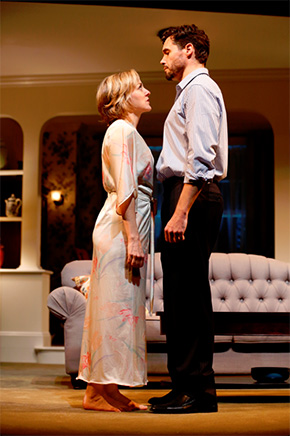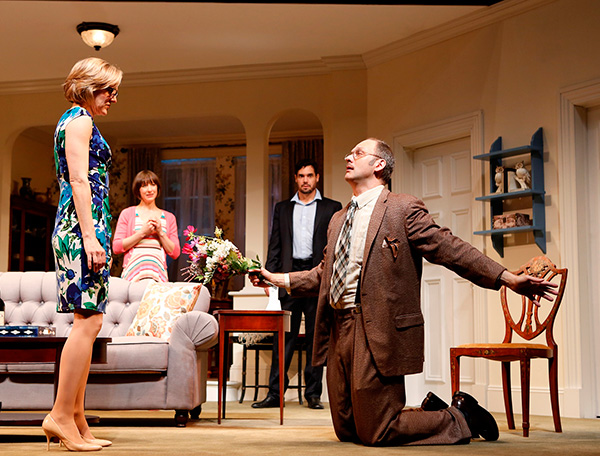
Connecticut Theater
"Things We Do For Love"
Westport Country Playhouse, Westport
 Freud got it all wrong, at least according to Alan Ayckbourn’s funny-poignant “Things We Do For Love.” The pioneering therapist wrote that we seek pleasure and avoid pain. Yet, in Ayckbourn’s 1997 play, now in a fast-paced rendering at Westport Country Playhouse, pleasure and pain are so artfully intermixed that they not only complement but feed upon one another.
Freud got it all wrong, at least according to Alan Ayckbourn’s funny-poignant “Things We Do For Love.” The pioneering therapist wrote that we seek pleasure and avoid pain. Yet, in Ayckbourn’s 1997 play, now in a fast-paced rendering at Westport Country Playhouse, pleasure and pain are so artfully intermixed that they not only complement but feed upon one another.
Our four characters suffer both emotional and physical discomfort. At the center is frigid, efficient, organized Barbara, as capable of managing her boss’ calendar as she is putting up a knick-knack shelf. (Not for nothing was she nicknamed “Spike” at school.) Shunning both relationships and marriage (“I chose to live alone,” she says), she’s paradoxically desired by her downstairs tenant, Gilbert, worshipped by her former school chum, Nikki, and entered into a passionate love-hate relationship with the chum’s fiancé, Hamish.
Even the set shows the admixture of ego and id. In the middle is Barbara’s fastidious flat where tea and nibbles are sedately served. The apartment above is a sloppy mess, dominated by a much-used bed. The one below harbors a secret obsession, highlighted by a lewd painting and cross-dressing paraphernalia.
Nikki and Hamish move into the upstairs flat while their house is being renovated, a fraught situation. But Barbara and Hamish’s instant antipathy is only a temporary roadblock. Beneath the cutting remarks is a lustful attraction that will eventually wound both Nikki, one of life’s victims, and Gilbert, who lives in the basement.
Ayckbourn once said, “People do a lot of damage to each other with the best of intentions. . . . Love can do a lot of unintended damage.” While we’re laughing at the author’s sunny humor in distilling the lengths to which humans will go for happiness, we still recognize the dark patches.
Under John Tillinger’s sprightly direction, the cast finds the reality beneath the farce. As Barbara, turning her emotions on a dime – caustic one minute, dissolved in tears the next – Geneva Carr is a superb bundle of repression whose awakening showers sparks. Sarah Manton is both plaintive and feisty as Nikki, while Matthew Greer’s Hamish reveals the sensitive soul hiding behind gruff masculinity and Michael Mastro’s Gilbert is both yearning and kooky without becoming grotesque,

The production looks handsome but James Noone’s over-designed setting is a major drawback. It could not have been easy fitting three floors and a huge staircase onto the Playhouse stage. But adding an uncalled-for, unused dining room pushes the set forward. The basement level lands up in the orchestra pit, making for problematic sightlines.
It’s not a fatal flaw, however. What’s missed visually, and sometimes aurally, should not deter theatergoers from enjoying this package of joy and provocation.
--by David A. Rosenberg
Aug. 25, 2014